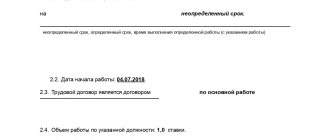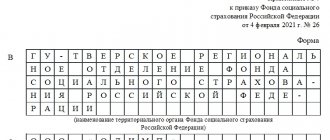The concept of disciplinary responsibility
Labor discipline implies compliance by the employee with the requirements of the Labor Code of the Russian Federation, as well as:
- rules of conduct at work and labor regulations established by the employer (Article 189 of the Labor Code of the Russian Federation);
- the official duties assigned to him (Article 192 of the Labor Code of the Russian Federation).
The rules of the first group, intended for the entire team, are defined in documents such as:
- internal organizational and administrative documents (rules, orders, instructions);
- a collective agreement affecting the provisions of the labor regulations.
The responsibilities of a specific employee are specified in those directly related to him:
- employment contract;
- job description for the position he holds.
When hiring, transferring to a position, or when developing a new internal document that is important for the employee’s performance of official functions, he must be familiarized with these documents against signature. This will mean that he is notified of all the requirements for his behavior at work, including:
- operating mode;
- a special procedure for completing procedures provided for by the Labor Code of the Russian Federation, if this is permitted by law;
- rules for compliance with labor safety and property safety;
- mandatory employee actions prior to starting work;
- subordination and directly performed job responsibilities.
Thus, due to the uniqueness of the duties performed by a particular employee, it may turn out that for him there is a special set of labor discipline rules, in relation to which, in certain cases, he will be subject to disciplinary liability and its types.
What is the essence of labor discipline?
Each employer establishes a number of specific rules of labor discipline, which are reflected in documents such as:
- internal labor regulations;
- collective agreement;
- an employment contract with a specific employee;
- employee's job responsibilities;
- labor protection instructions;
- legal requirements and internal regulations.
The employee is obliged to comply with these rules (Article 21, 189 of the Labor Code of the Russian Federation), and the employer has the right to reward the employee for their conscientious compliance (Article 22, 191 of the Labor Code of the Russian Federation) and to punish for non-compliance or improper execution (Article 22, 192 of the Labor Code of the Russian Federation ).
To punish an employee, you need to establish:
- whether the disciplinary offense is among those for which punishment can be applied;
- whether all prerequisites for filing claims against the employee have been met;
- whether the documents establishing the rules of labor discipline are drawn up correctly.
An employer may exercise the right to punishment if:
- the fact that the employee is familiar with the rules of labor discipline is confirmed;
- the employee is guilty of a disciplinary offense;
- the fact of the existence of the offense is documented;
- the employee is given the opportunity to justify his misconduct;
- all rules established for the procedure for applying punishment have been observed.
The decision to apply punishment must be made by a person who has the right to do so, which is documented for him. It could be:
- an individual who is an employer;
- the head of the organization or another official authorized by him.
Only compliance by the employer with all the rules established for the procedure for applying punishment will give grounds to consider this punishment legal and will not entail negative consequences if the employee decides to challenge it.
Disciplinary liability and the Labor Code of the Russian Federation
The employer needs to determine disciplinary liability and its types when an employee deliberately violates the rules of labor discipline: either generally established or related only to him alone.
The employer has the right to punish for this (Articles 22, 192 of the Labor Code of the Russian Federation). However, the list of punishments for disciplinary offenses for most employers is limited to the list given in Art. 192 Labor Code of the Russian Federation. In accordance with this list, the types of disciplinary liability are:
- comment;
- rebuke;
- dismissal.
NOTE! A monetary fine cannot be used as a disciplinary sanction. For this, the employer himself may receive a fine from the labor inspectorate. And if the fined person goes to court, the employer will be obliged to reimburse him for what was withheld and to pay interest for the delay under Art. 236 of the Labor Code of the Russian Federation, and possibly compensation for moral damage. Whether it is possible to deprive employees of bonuses for misconduct, find out here.
Legislation for certain categories of employees may provide for other disciplinary liability and its types. But most often the choice is made from the 3 listed options. Of these, the first 2 are measures of educational influence on an employee who continues to work for the employer, and the last is an extreme measure that is resorted to if the employee is a persistent offender or commits a one-time but serious offense that is incompatible with his further performance of duties. But even if a serious violation is committed, the employer has the right not to resort to dismissal, but to choose a different measure of punishment.
Labor legislation allows only one of the possible punishments to be applied as a deterrent to a violation (Article 193 of the Labor Code of the Russian Federation). However, the same employee may be punished repeatedly and with different types of punishment if:
- the violation is not stopped by punishment;
- repeats periodically;
- a new type of offense is being committed.
In addition, if the actions of a violating employee cause material damage to the employer, then double liability may be applied to him for one offense (Article 248 of the Labor Code of the Russian Federation): both disciplinary and material.
When can a separate punishment be applied for each offense?
If the employee continues to commit offenses, he may be punished separately for each of the disciplinary offenses he has committed (and it is permissible to apply new types of punishments up to and including dismissal) in the following cases:
- a continuing violation, i.e. when an employee continues to commit a disciplinary offense for which he is punished, and it is obvious that the first punishment did not help;
- periodic violations similar to the violation for which the employee has already been punished;
- committing a new type of disciplinary offense.
Possible disciplinary violations
The disciplinary action taken against an employee depends on many factors:
- the specific situation in which the violation occurred;
- the personality and merits of the employee;
- severity of consequences;
- whether the employee has other violations.
Therefore, each misconduct is considered by the manager individually, and a decision is made after analyzing all the circumstances.
Such a seemingly mild measure of influence as a reprimand is also a type of disciplinary liability. Anticipating punishment in the form of a reprimand, it is used in situations where an employee:
- is late for work or is absent from the workplace for a long time;
- does not complete the usual volumes of work or fails to meet deadlines;
- does not follow orders and instructions from management;
- refuses to undergo mandatory examinations or instructions;
- refuses to complete the documents necessary for his line of work.
For more information about the procedure for issuing a reprimand, read the material “Reprimand as a disciplinary sanction (nuances).”
Dismissal may result from such offenses as:
- systematic lateness, absenteeism;
- causing significant harm to the employer;
- actions incompatible with the work being performed.
When is a violation of discipline a reason for dismissal?
Serious offenses for which dismissal is permissible, including if committed once:
- systematic violations of discipline (clause 5 of article 81 of the Labor Code of the Russian Federation);
- absenteeism, which equates to absence from the workplace for more than 4 hours in a row, as well as the entire working day or entire shift (subclause a, clause 6, article 81 of the Labor Code of the Russian Federation);
- being at work under the influence of intoxicants (subparagraph “b”, paragraph 6, article 81 of the Labor Code of the Russian Federation);
- disclosure of any secrets (subparagraph “c” of paragraph 6 of Article 81 of the Labor Code of the Russian Federation);
- causing damage to someone else's property (subparagraph “d”, paragraph 6, article 81 of the Labor Code of the Russian Federation);
- causing severe consequences to people and property or creating a high probability of such consequences occurring (subparagraph “d”, paragraph 6, article 81 of the Labor Code of the Russian Federation);
- actions entailing loss of trust (clauses 7 and 7.1 of Article 81 of the Labor Code of the Russian Federation);
- immoral act of the teacher (clause 8 of article 81 of the Labor Code of the Russian Federation);
- decision of the head of the organization that led to significant material damage (clause 9 of Article 81 of the Labor Code of the Russian Federation);
- gross violation by the head of the organization of his direct labor duties (clause 10 of article 81 of the Labor Code of the Russian Federation);
- gross violation by a teacher of the charter of an educational organization for the second time in a year (clause 1 of Article 336 of the Labor Code of the Russian Federation);
- violation by an athlete of anti-doping rules or his disqualification (Article 348.11 of the Labor Code of the Russian Federation).
How to correctly issue an order to punish a violator?
The procedure for applying punishment will comply with legal requirements if a number of rules are observed:
- Before being allowed to work, a new employee must be familiarized with all the standards of conduct and duties that he must perform, on receipt.
- The employee’s clear fault must be seen in the misconduct committed.
- Each violation, when detected, is immediately documented.
- The employee is given 2 working days to submit his explanation of what happened in writing. He can refuse this. Then they draw up an act of refusal to provide explanations.
- A decision on collection can be made no later than 1 month from the date of discovery of the offense and before the expiration of 6 months (and for financial violations - 2 years) from the date of its commission. These periods do not include some periods during which the employee is absent from work (Article 193 of the Labor Code of the Russian Federation).
- The employee is presented with the order of punishment against receipt no later than 3 working days from the date of its preparation. If you refuse to sign it, an act is drawn up.
When drawing up an order on disciplinary liability, you can create a sample yourself; be guided by the regulations. But it is better to use the recommendations contained on our website.
To learn how to correctly draw up an order to punish an employee, read the material “Order on Disciplinary Sanction - Sample and Form.”
The procedure for imposing disciplinary sanctions
The procedure for imposing disciplinary sanctions is established by laws and regulations depending on the categories of persons to whom they are applied. Therefore, we will consider the basic requirements for the procedure for imposing disciplinary sanctions, characteristic of almost all those brought to disciplinary liability.
Disciplinary sanctions may be imposed subject to a number of procedural requirements:
- they are imposed only by authorized bodies or officials;
- before imposing a penalty, written explanations from the violator are required;
- they must be imposed no later than 10 days from the moment when the relevant boss became aware of the fact that an offense had been committed, and in the case of an internal audit, no later than one month from the end of the audit;
- Only one penalty can be imposed for one offense;
- penalties cannot be imposed after six months from the date of commission of the offense;
- the fact of imposition of a penalty can be appealed in accordance with the established procedure, etc.
How to remove a reprimand or reprimand?
For an employee dismissed due to a disciplinary offense, the question of removing the punishment does not arise, but for an employee who continues to work, a penalty in the form of a remark or reprimand can be lifted (Article 194 of the Labor Code of the Russian Federation). This happens in one of 2 cases:
- when its validity period expires, which is equal to 1 year from the date of imposition of the penalty, if no new violations occurred during this time;
- before the expiration date, if anyone initiates an early withdrawal issue; this could be the employee himself, his immediate superior, the workforce or the employer’s manager.
In the first case, no organizational and administrative documents are needed - the penalty is lifted automatically. And in the second, an order to withdraw is issued.
For more information about the order that lifts a disciplinary penalty, read the material “Order to lift a disciplinary sanction - sample.”
Documentation
IMPORTANT! Recommendations for registering the fact that an employee has committed a disciplinary offense from ConsultantPlus are available here
Any disciplinary offense must be documented. The employee has the right to appeal to the labor inspectorate, bodies that consider individual labor disputes, and the employer will have to prove his point of view on the basis of these documents.
The fact of a disciplinary offense is reflected in a memo addressed to the head of the company. In addition to the most negative fact, it should contain:
- time;
- link to the document whose provisions have been violated;
- consequences of irresponsible actions.
If the immediate supervisor of a negligent employee reports, he may recommend some form of disciplinary action.
Next, you need to obtain an explanation from the employee regarding the disciplinary offense in writing. If he refuses, an act recording the refusal is required, in which case the penalty can still be applied.
Then an order regarding the penalty and the procedure for its application is issued. The employee must sign the document indicating that he is familiar with the contents. The refusal here is recorded in the same way - by an act signed by three or more witnesses who are not personally interested in the application of the penalty.
Information about the punishment incurred may be reflected in the employee’s personal card, but this is not necessary. With the exception of the most severe - dismissal, disciplinary sanctions are not included in the work book.
Features of conducting an official investigation in case of violation of labor discipline by an employee.
Results
The concept of disciplinary liability is that an employee must be punished for violating labor discipline. Knowledge of situations in which disciplinary liability arises and its types allows the employer to influence employees who violate labor discipline. The range of this impact is quite wide, depends on many circumstances and requires compliance with all rules of application.
Sources:
- Labor Code of the Russian Federation.
You can find more complete information on the topic in ConsultantPlus. Free trial access to the system for 2 days.








